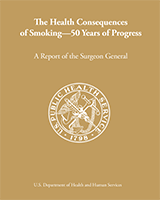NCBI Bookshelf. A service of the National Library of Medicine, National Institutes of Health.
National Center for Chronic Disease Prevention and Health Promotion (US) Office on Smoking and Health. The Health Consequences of Smoking—50 Years of Progress: A Report of the Surgeon General. Atlanta (GA): Centers for Disease Control and Prevention (US); 2014.

The Health Consequences of Smoking—50 Years of Progress: A Report of the Surgeon General.
Show detailsAssistant Secretary for Health
The nation stands poised at the crossroads of tobacco control. On one hand, we can celebrate tremendous progress 50 years after the landmark 1964 Surgeon General's report: Smoking and Health. Adult smoking rates have fallen from about 43% (1965) to about 18% today. Mortality rates from lung cancer, the leading cause of cancer death in this country, are declining. Most smokers visiting health care settings are now routinely asked and advised about tobacco use. On the other hand, cigarette smoking remains the chief preventable killer in America, with more than 40 million Americans caught in a web of tobacco dependence. Each day, more than 3,200 youth (younger than 18 years of age) smoke their first cigarette and another 2,100 youth and young adults who are occasional smokers progress to become daily smokers. Furthermore, the range of emerging tobacco products complicates the current public health landscape.
In this context, the 50th Anniversary of the Surgeon General's report prompts us to pause and ask why this addiction persists when proven interventions can eliminate it. Of great concern, too many in our nation assume that past success in tobacco control guarantees future progress; nothing can be further from the truth. To rejuvenate and reinvigorate national efforts, in 2010, the U.S. Department of Health and Human Services unveiled its first ever strategic plan for tobacco control. Ending the Tobacco Epidemic: A Tobacco Control Strategic Action Plan provides a critical framework to guide efforts to rapidly drop prevalence rates of smoking among youth and adults. A major foundation and pillar of the plan is to encourage and promote leadership throughout all sectors of society. Now, this current 2014 Surgeon General's report can accelerate that leadership to fully implement the life-saving prevention that can make the next generation free of tobacco-related death and disease.
We have many tools that we know work. A comprehensive public policy approach emphasizing mass media campaigns to encourage prevention and quit attempts, smokefree policies, restrictions on youth access to tobacco products, and price increases can collectively drive further meaningful reductions in tobacco use. Furthermore, we can accelerate progress through full commitment to clinical and public health advances; including the widespread use of telephone quit lines and science-based counseling and medications for tobacco users. Promoting progress today also requires recognizing that tobacco use has evolved from being an equal-opportunity killer to one threatening the most vulnerable members of our society. We must confront, and reverse, the tragically higher tobacco use rates that threaten persons of low socioeconomic status, sexual minorities, high school dropouts, some racial/ethnic minority groups, and those living with mental illness and substance use disorders.
Of all the accomplishments of the 20th century, historians rank the 1964 Surgeon General's report as one of the seminal public health achievements of our time. Armed with both science and resolve, we can continue to honor the legacy of the report by completing the work it began in the last century. The current 2014 Surgeon General's report represents a national vision for getting the job done. With strategy, commitment, and action, our nation can leave the crossroads and move forward to end the tobacco epidemic once and for all.
- Message from Howard Koh - The Health Consequences of Smoking—50 Years of Progres...Message from Howard Koh - The Health Consequences of Smoking—50 Years of Progress
Your browsing activity is empty.
Activity recording is turned off.
See more...